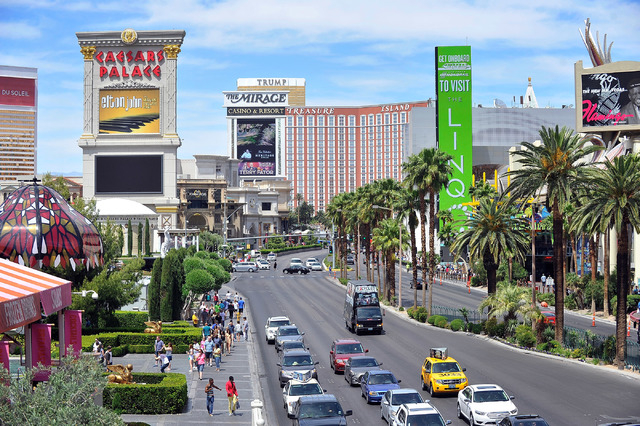Inside Gaming: Weight of debt won’t go away

The investment community long has expressed concern over the growing debt that weighs down many casino companies, most notably the $21 billion anchor around the neck of Caesars Entertainment Corp.
Deutsche Bank gaming analyst Andrew Zarnett in April told investors that Caesars might have to sell or close properties to get out from under its obligations. He included $1.04 billion in debt that comes due next year and $2.02 billion in maturities the company faces in 2016.
Last Tuesday, Caesars announced a five-step plan for eliminating the company’s 2015 financial obligations and reduce the upcoming debts due in 2016 and 2017. Caesars plans to raise $1.75 billion in new debt and sell 5 percent of the company’s equity to institutional investors.
De-leveraging and hope for an economic recovery could be the game plan of many casino operators.
Under-performing or non-core casinos could be cut loose.
According to Moody’s Investors Service gaming analyst Keith Moody, refinancing debt will be more costly in coming years. Without sufficient earnings growth for casino operators, concern over debt maturities will increase.
In an April 29 report, Foley said 2018 is shaping up as a pivotal year for the casino industry.
Among 33 U.S. gaming companies with Moody’s B-rated debt, 36 percent of total obligations will come due by the end of 2018. More than half of the debt held by 12 companies will mature by then.
Foley said the gaming sector as a whole will struggle to grow earnings and reduce relatively high leverage.
“Although the sector has stabilized since the recession, it has not shown signs that it has, or will, improve along with the broader economy,” Foley said.
Under normal operating conditions, gaming companies wouldn’t have trouble refinancing debt.
Despite recent positive trends from Las Vegas and other markets, the operating conditions still are not normal.
Foley said three companies have the most troubled long term debt: the Mohegan Tribal Gaming Authority, which owns the Mohegan Sun casino in Connecticut; CCM Merger, parent company of the Detroit’s Motor City Casino; and Marina District Finance Co., the partnership which owns the Borgata in Atlantic City.
Marina District is half-owned by Boyd Gaming Corp. and MGM Resorts International.
Boyd operates the Borgata, which leads Atlantic City in gaming revenue.
MGM Resorts’ half of the partnership has been in a blind trust since 2010, when New Jersey gaming regulators rejected the company’s business partner in Macau. MGM Resorts hopes to regain its gaming license and its share of the Borgata this year.
The Borgata debt is not large by industry comparison, with roughly $440 million due in 2018. Having MGM Resorts back in the mix could be enough to resolve any concern.
Moody’s also said the quality of the Borgata property and potential Internet gaming revenues could mitigate any concerns.
Foley called Boyd Gaming “highly leveraged,” which seems odd compared to its peer group.
Boyd has $4.37 billion in long-term debt, far below MGM Resorts’ $12.9 billion, Las Vegas Sands Corp.’s $10.27 billion, and Wynn Resorts Ltd.’s $7.3 billion. All but Boyd operate in the lucrative Macau casino market.
Foley said Boyd’s geographically diverse U.S. casino mix — 22 properties in eight states — “could have some favorable effect on Marina District’s ability to refinance.”
Zarnett speculated that several of Boyd’s “noncore” casinos could be sold as part of the gaming industry’s “disposition landscape” in 2014. He included Revel in Atlantic City and The Cosmopolitan of Las Vegas, two costly but underperforming luxury hotel-casinos, as other sale targets this year.
Zarnett’s list of potential buyers is long: Gaming and Leisure Properties (Penn National Gaming’s real estate investment trust), Baltimore-based Cordish Cos., Malaysia-based Genting Group, Golden Nugget, Rush Street Gaming, Seminole Hard Rock and private equity groups.
Affinity Gaming, Full House Resorts and Tropicana Entertainment could buy or sell.
Foley said there was some good news for the debt-laden industry: Casinos have a few years of breathing room and only 13 percent of total outstanding debt is due by 2016.
“Additionally, none of these companies has weak liquidity,” he said.
Caesars Entertainment isn’t so lucky.
Zarnett said the company already is addressing its financial matters.
Caesars said in March that it will close the money-losing Harrah’s Tunica on June 2, the largest of the company’s three casinos in northern Mississippi.
In 2013, Caesars Entertainment launched Caesars Growth Partners as a development vehicle. The entity, publicly traded as Caesars Acquisition Co., is 57-percent owned by Caesars Entertainment. The business owns Planet Hollywood Resort, a tower at Caesars Palace, Caesars’ online and social gaming operations, the World Series of Poker, and the under-construction Horseshoe Casino Baltimore.
In March, Caesars announced the sale of Bally’s Las Vegas, The Quad, Harrah’s New Orleans and The Cromwell to Caesars Growth Partners for $2.2 billion and $185 million in assumed debt.
Caesars Entertainment disclosed, however, that it received letters from two law firms claiming to act on behalf of lenders and bondholders. The lawyers contend the transaction is improper because Caesars is insolvent, which the company denied.
Zarnett said other casino sales or additional moves to place more properties under Caesars Acquisition also could be challenged.
Howard Stutz’s Inside Gaming column appears Wednesdays and Sundays. He can be reached at hstutz@reviewjournal.com or 702-477-3871. Follow @howardstutz on Twitter.












